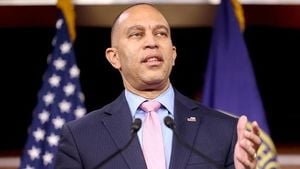It’s not every day that the United States government publicly rebukes one of its closest allies for violating fundamental freedoms. But that’s exactly what happened this week, as Washington issued a stinging condemnation of the United Kingdom’s expanding restrictions on free speech—particularly those surrounding abortion clinic “buffer zones” and broader curbs on public expression. The U.S. State Department’s latest Country Report on Human Rights Practices (CRHRP), released on August 20, 2025, paints a stark picture: Britain, long seen as a bastion of liberty, is now flagged as a risky place to speak one’s mind.
The rebuke wasn’t just a dry bureaucratic note. According to Newsweek, the State Department called Britain’s censorship “an egregious violation” of free speech, echoing Vice President JD Vance’s pointed remarks at the Munich Security Conference earlier this year. Vance’s comments weren’t minced: he warned that these laws “represent a concerning departure from the shared values that ought to underpin U.S.-U.K. relations.” For two nations whose “special relationship” is built on more than just military alliances or financial markets—on a shared heritage of freedom—these are fighting words.
So, what exactly has provoked such strong language from America’s top diplomats? The answer lies in a series of high-profile incidents and new legal frameworks that, critics say, cross the line from regulating protest to policing thought itself. In Bournemouth, for instance, army veteran Adam Smith-Connor was convicted and fined over £9,000 simply for silently praying near an abortion facility—in remembrance of a child he had lost. He wasn’t shouting, blocking access, or even holding a sign. He was, quite literally, praying in his head.
Meanwhile, in Glasgow, 75-year-old Rose Docherty was arrested for displaying a sign within 200 meters of a hospital that read, “coercion is a crime, here to talk, only if you want.” According to Newsweek, neither Smith-Connor nor Docherty were engaged in intimidation or obstruction. They were ordinary people, criminalized for the most peaceful expressions imaginable. The architect of Scotland’s buffer zone law even admitted that it could, technically, criminalize citizens for praying visibly within their own homes—if someone passing by could see them through the window. That’s not just a slippery slope; it’s a headlong tumble toward thought policing.
The CRHRP doesn’t stop with abortion clinic zones. It also highlights the Online Safety Act, which curtails internet speech and gives Ofcom—the UK’s communications regulator—broad powers to police online content. The report notes credible restrictions on freedom of expression, including “enforcement of or threat of criminal or civil laws in order to limit expression; and crimes, violence, or threats of violence motivated by anti-Semitism.” The government’s efforts to stamp out so-called “hate speech” or “misinformation” have, in practice, led to ordinary Brits being accused of “Non-Crime Hate Incidents”—a bureaucratic term that, as The Telegraph points out, has consumed untold police resources.
Some cases are as Kafkaesque as they sound. Lucy Connolly remains imprisoned for making an “unwise” online post—one she later deleted. Hamit Coskun was prosecuted after burning a book. And then there are the workplace repercussions: prison officer David Toshack and nurse Jennifer Melle, for example, were disciplined or dismissed for refusing to accept “forced speech codes” around gender ideology. Teacher Simon Pearson faced consequences for criticizing government action on social media. For many, these stories signal a chilling environment where dissent is not just frowned upon, but potentially career-ending—or even criminal.
Of course, British lawmakers defend these anti-free speech laws in the name of “protecting women” or shielding vulnerable groups. But as Newsweek’s Lois McLatchie asks, “How fragile is our notion of women’s rights if it cannot withstand the presence of a woman offering conversation?” The criminalization of peaceful prayer or offers of help, she argues, serves no woman and instead isolates those seeking support. “True compassion provides company—it does not silence,” she writes. The United States, in her view, is right to raise its voice, amplifying concerns that many Brits have been voicing for years.
For some, the U.S. report is a wake-up call. According to Simon Hankinson, writing in The Telegraph, “The State Department has called it out.” He draws a comparison to repressive regimes typically featured in the CRHRP—countries like China or Zimbabwe, where free speech is routinely suppressed. That the UK now finds itself in such company, at least in the eyes of American officials, should give pause. Hankinson warns, “There is already a semi-official dogma on gender ideology, immigration, and crime which it is costly to challenge. Censorship and group-think get worse if not disrupted.”
Not everyone in Britain is likely to welcome this transatlantic criticism. Hankinson predicts that “the British Left will be as indignant and in denial as the establishment in Washington DC is about crime.” He points out that, just as U.S. officials sometimes massage crime statistics for political ends, the British government and media are happy to overlook or minimize cases like Lucy Connolly’s or the thousands of “Non-Crime Hate Incidents.” The risk, he argues, is that Britain’s slow drift toward repression will go unnoticed by those living through it—like the proverbial frog in slowly heating water.
The broader question is what all this means for the so-called “special relationship.” As McLatchie puts it, “The special relationship cannot be sustained on military spending and trade deals alone. It depends on something deeper: the conviction that conscience is sacred, that free speech is worth protecting, and that liberty is not a privilege granted by the state but a right that precedes it.” If Britain continues down the path of criminalizing thought and prayer, she warns, the alliance risks being reduced to “polite diplomacy while its moral core rots away.”
History offers cautionary tales. Writers like George Orwell and Aldous Huxley imagined futures where independent thought was banned and speech violators punished. For critics of Britain’s current trajectory, those dystopian visions no longer seem so far-fetched. Hankinson urges, “Instead of rejecting America’s criticism in high dudgeon, I hope Britain will heed the warning of its Atlantic cousins and return to the people their right to speak their minds.”
For now, the U.S. government’s unusually blunt intervention has shone a spotlight on a growing transatlantic rift over the meaning of liberty. Whether Britain will reconsider its course, or double down on its current path, remains to be seen. But as both sides of the Atlantic debate the future of free speech, one thing is clear: the world is watching, and the stakes could not be higher.



